Participation and Children's Rights: A Detailed Analysis of UNCRC 12
VerifiedAdded on 2023/06/13
|12
|4024
|461
Report
AI Summary
This report provides an in-depth analysis of children's rights to participation as outlined in the UN Convention on the Rights of the Child (UNCRC) Article 12. It explores the meaning of participation, highlighting its importance in children's development and the creation of accountability. The report identifies potential barriers to participation, such as adults not listening to children, abuse of power, and lack of adequate information, as well as the benefits, including improved communication skills, decision-making abilities, and a sense of belonging. Furthermore, it discusses how participation can be promoted through active involvement in decision-making processes within families, schools, and communities, emphasizing the need for mutual respect and shared information between children and adults. The report concludes by underscoring the significance of Article 12 in empowering children to express their views and contribute to matters affecting their lives.
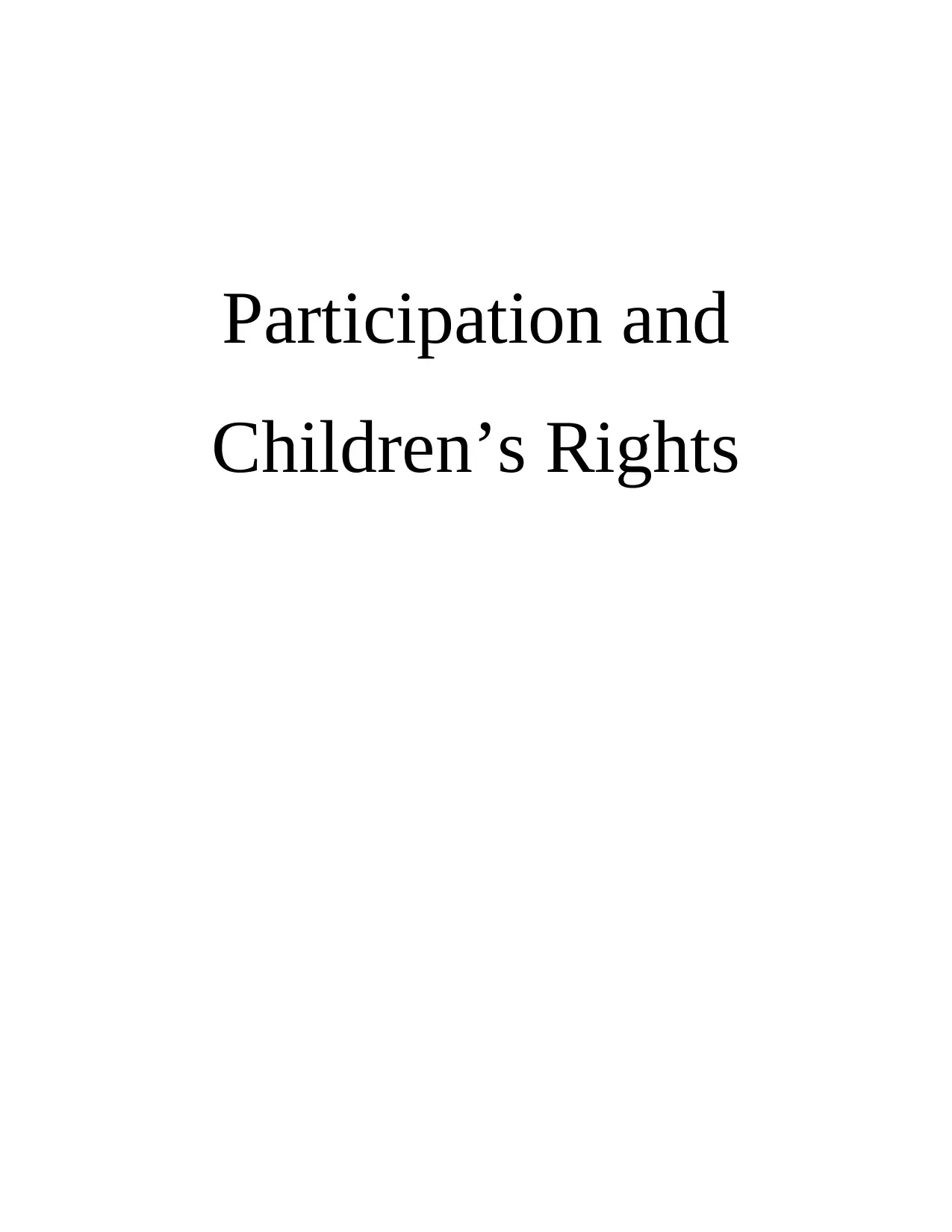
Participation and
Children’s Rights
Children’s Rights
Paraphrase This Document
Need a fresh take? Get an instant paraphrase of this document with our AI Paraphraser
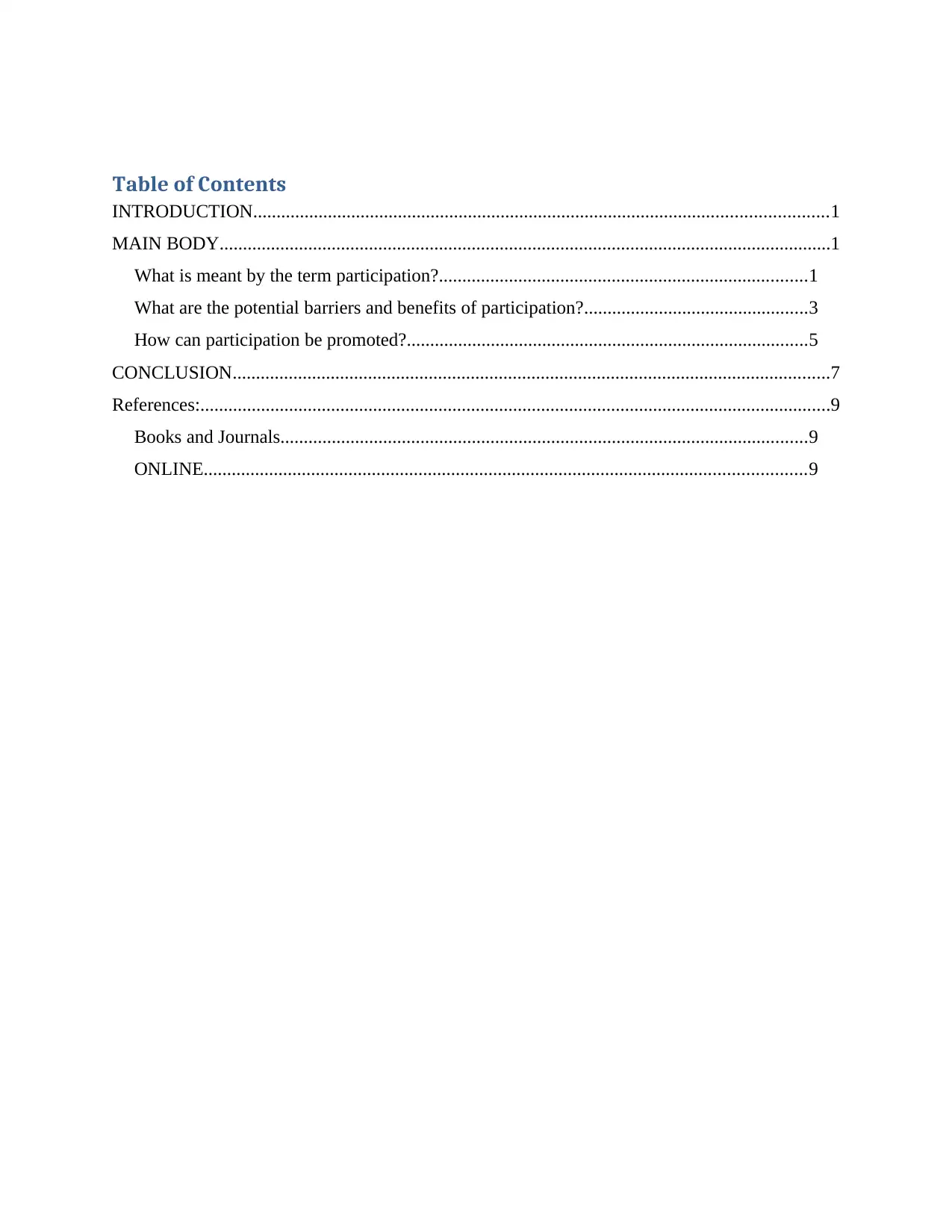
Table of Contents
INTRODUCTION...........................................................................................................................1
MAIN BODY...................................................................................................................................1
What is meant by the term participation?...............................................................................1
What are the potential barriers and benefits of participation?................................................3
How can participation be promoted?......................................................................................5
CONCLUSION................................................................................................................................7
References:.......................................................................................................................................9
Books and Journals.................................................................................................................9
ONLINE.................................................................................................................................9
INTRODUCTION...........................................................................................................................1
MAIN BODY...................................................................................................................................1
What is meant by the term participation?...............................................................................1
What are the potential barriers and benefits of participation?................................................3
How can participation be promoted?......................................................................................5
CONCLUSION................................................................................................................................7
References:.......................................................................................................................................9
Books and Journals.................................................................................................................9
ONLINE.................................................................................................................................9
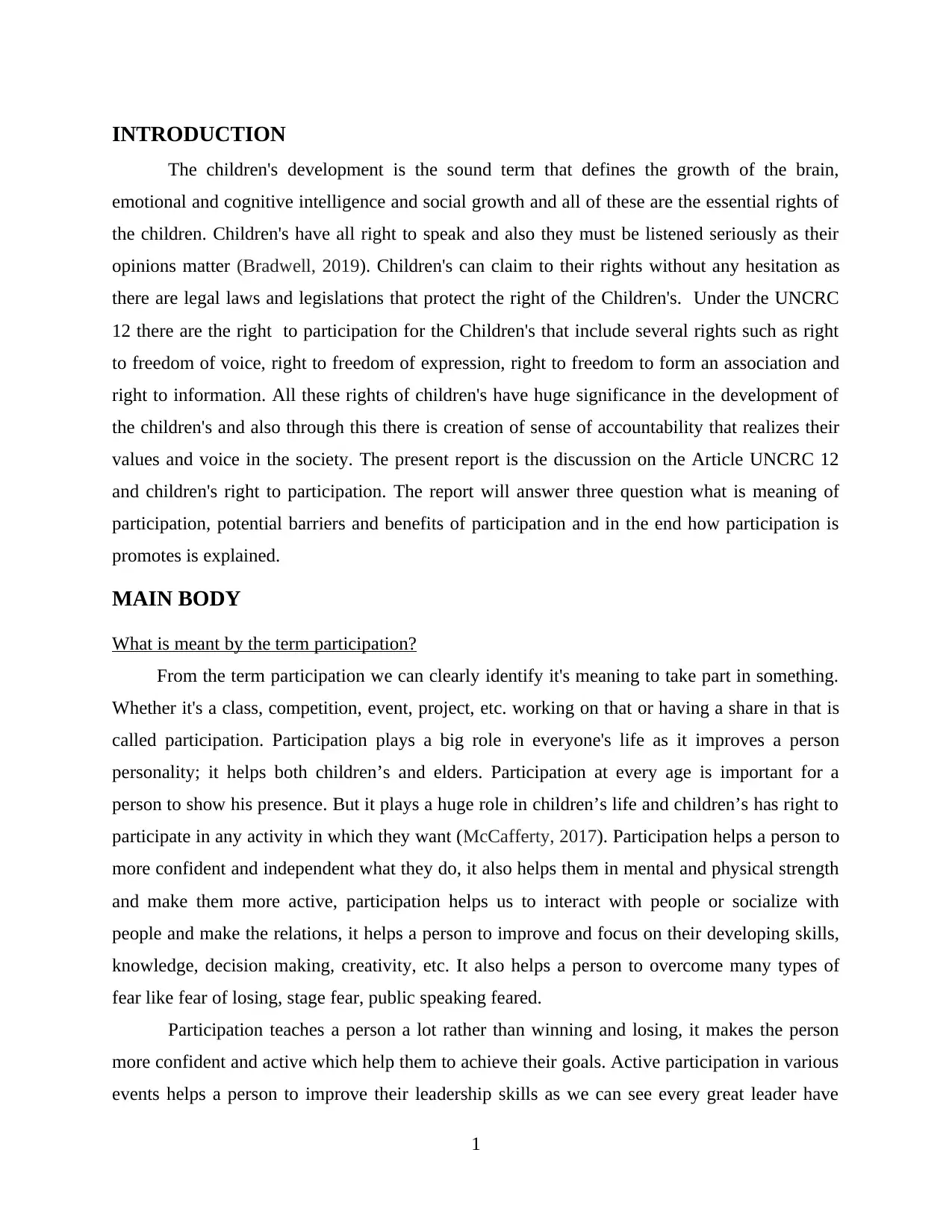
INTRODUCTION
The children's development is the sound term that defines the growth of the brain,
emotional and cognitive intelligence and social growth and all of these are the essential rights of
the children. Children's have all right to speak and also they must be listened seriously as their
opinions matter (Bradwell, 2019). Children's can claim to their rights without any hesitation as
there are legal laws and legislations that protect the right of the Children's. Under the UNCRC
12 there are the right to participation for the Children's that include several rights such as right
to freedom of voice, right to freedom of expression, right to freedom to form an association and
right to information. All these rights of children's have huge significance in the development of
the children's and also through this there is creation of sense of accountability that realizes their
values and voice in the society. The present report is the discussion on the Article UNCRC 12
and children's right to participation. The report will answer three question what is meaning of
participation, potential barriers and benefits of participation and in the end how participation is
promotes is explained.
MAIN BODY
What is meant by the term participation?
From the term participation we can clearly identify it's meaning to take part in something.
Whether it's a class, competition, event, project, etc. working on that or having a share in that is
called participation. Participation plays a big role in everyone's life as it improves a person
personality; it helps both children’s and elders. Participation at every age is important for a
person to show his presence. But it plays a huge role in children’s life and children’s has right to
participate in any activity in which they want (McCafferty, 2017). Participation helps a person to
more confident and independent what they do, it also helps them in mental and physical strength
and make them more active, participation helps us to interact with people or socialize with
people and make the relations, it helps a person to improve and focus on their developing skills,
knowledge, decision making, creativity, etc. It also helps a person to overcome many types of
fear like fear of losing, stage fear, public speaking feared.
Participation teaches a person a lot rather than winning and losing, it makes the person
more confident and active which help them to achieve their goals. Active participation in various
events helps a person to improve their leadership skills as we can see every great leader have
1
The children's development is the sound term that defines the growth of the brain,
emotional and cognitive intelligence and social growth and all of these are the essential rights of
the children. Children's have all right to speak and also they must be listened seriously as their
opinions matter (Bradwell, 2019). Children's can claim to their rights without any hesitation as
there are legal laws and legislations that protect the right of the Children's. Under the UNCRC
12 there are the right to participation for the Children's that include several rights such as right
to freedom of voice, right to freedom of expression, right to freedom to form an association and
right to information. All these rights of children's have huge significance in the development of
the children's and also through this there is creation of sense of accountability that realizes their
values and voice in the society. The present report is the discussion on the Article UNCRC 12
and children's right to participation. The report will answer three question what is meaning of
participation, potential barriers and benefits of participation and in the end how participation is
promotes is explained.
MAIN BODY
What is meant by the term participation?
From the term participation we can clearly identify it's meaning to take part in something.
Whether it's a class, competition, event, project, etc. working on that or having a share in that is
called participation. Participation plays a big role in everyone's life as it improves a person
personality; it helps both children’s and elders. Participation at every age is important for a
person to show his presence. But it plays a huge role in children’s life and children’s has right to
participate in any activity in which they want (McCafferty, 2017). Participation helps a person to
more confident and independent what they do, it also helps them in mental and physical strength
and make them more active, participation helps us to interact with people or socialize with
people and make the relations, it helps a person to improve and focus on their developing skills,
knowledge, decision making, creativity, etc. It also helps a person to overcome many types of
fear like fear of losing, stage fear, public speaking feared.
Participation teaches a person a lot rather than winning and losing, it makes the person
more confident and active which help them to achieve their goals. Active participation in various
events helps a person to improve their leadership skills as we can see every great leader have
1
⊘ This is a preview!⊘
Do you want full access?
Subscribe today to unlock all pages.

Trusted by 1+ million students worldwide
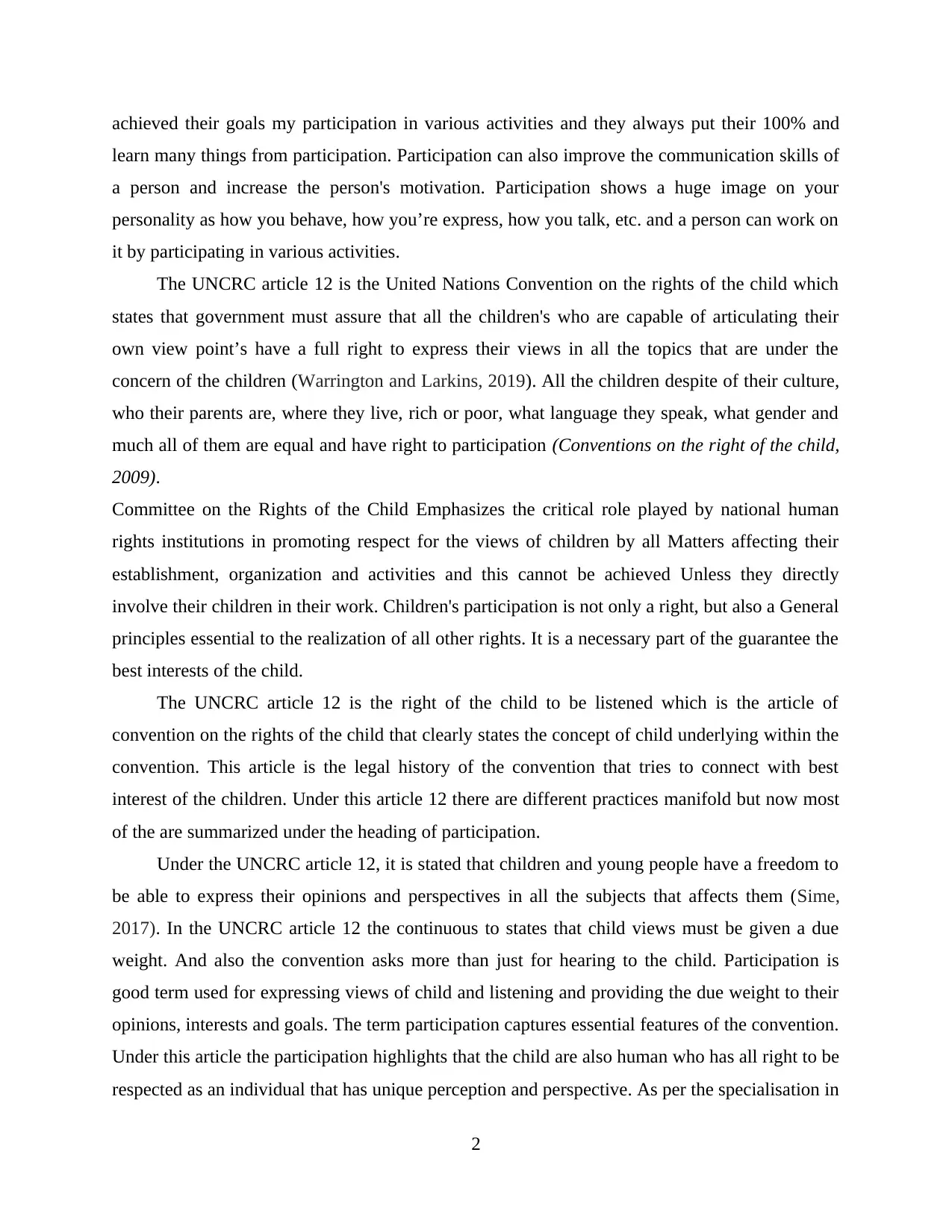
achieved their goals my participation in various activities and they always put their 100% and
learn many things from participation. Participation can also improve the communication skills of
a person and increase the person's motivation. Participation shows a huge image on your
personality as how you behave, how you’re express, how you talk, etc. and a person can work on
it by participating in various activities.
The UNCRC article 12 is the United Nations Convention on the rights of the child which
states that government must assure that all the children's who are capable of articulating their
own view point’s have a full right to express their views in all the topics that are under the
concern of the children (Warrington and Larkins, 2019). All the children despite of their culture,
who their parents are, where they live, rich or poor, what language they speak, what gender and
much all of them are equal and have right to participation (Conventions on the right of the child,
2009).
Committee on the Rights of the Child Emphasizes the critical role played by national human
rights institutions in promoting respect for the views of children by all Matters affecting their
establishment, organization and activities and this cannot be achieved Unless they directly
involve their children in their work. Children's participation is not only a right, but also a General
principles essential to the realization of all other rights. It is a necessary part of the guarantee the
best interests of the child.
The UNCRC article 12 is the right of the child to be listened which is the article of
convention on the rights of the child that clearly states the concept of child underlying within the
convention. This article is the legal history of the convention that tries to connect with best
interest of the children. Under this article 12 there are different practices manifold but now most
of the are summarized under the heading of participation.
Under the UNCRC article 12, it is stated that children and young people have a freedom to
be able to express their opinions and perspectives in all the subjects that affects them (Sime,
2017). In the UNCRC article 12 the continuous to states that child views must be given a due
weight. And also the convention asks more than just for hearing to the child. Participation is
good term used for expressing views of child and listening and providing the due weight to their
opinions, interests and goals. The term participation captures essential features of the convention.
Under this article the participation highlights that the child are also human who has all right to be
respected as an individual that has unique perception and perspective. As per the specialisation in
2
learn many things from participation. Participation can also improve the communication skills of
a person and increase the person's motivation. Participation shows a huge image on your
personality as how you behave, how you’re express, how you talk, etc. and a person can work on
it by participating in various activities.
The UNCRC article 12 is the United Nations Convention on the rights of the child which
states that government must assure that all the children's who are capable of articulating their
own view point’s have a full right to express their views in all the topics that are under the
concern of the children (Warrington and Larkins, 2019). All the children despite of their culture,
who their parents are, where they live, rich or poor, what language they speak, what gender and
much all of them are equal and have right to participation (Conventions on the right of the child,
2009).
Committee on the Rights of the Child Emphasizes the critical role played by national human
rights institutions in promoting respect for the views of children by all Matters affecting their
establishment, organization and activities and this cannot be achieved Unless they directly
involve their children in their work. Children's participation is not only a right, but also a General
principles essential to the realization of all other rights. It is a necessary part of the guarantee the
best interests of the child.
The UNCRC article 12 is the right of the child to be listened which is the article of
convention on the rights of the child that clearly states the concept of child underlying within the
convention. This article is the legal history of the convention that tries to connect with best
interest of the children. Under this article 12 there are different practices manifold but now most
of the are summarized under the heading of participation.
Under the UNCRC article 12, it is stated that children and young people have a freedom to
be able to express their opinions and perspectives in all the subjects that affects them (Sime,
2017). In the UNCRC article 12 the continuous to states that child views must be given a due
weight. And also the convention asks more than just for hearing to the child. Participation is
good term used for expressing views of child and listening and providing the due weight to their
opinions, interests and goals. The term participation captures essential features of the convention.
Under this article the participation highlights that the child are also human who has all right to be
respected as an individual that has unique perception and perspective. As per the specialisation in
2
Paraphrase This Document
Need a fresh take? Get an instant paraphrase of this document with our AI Paraphraser
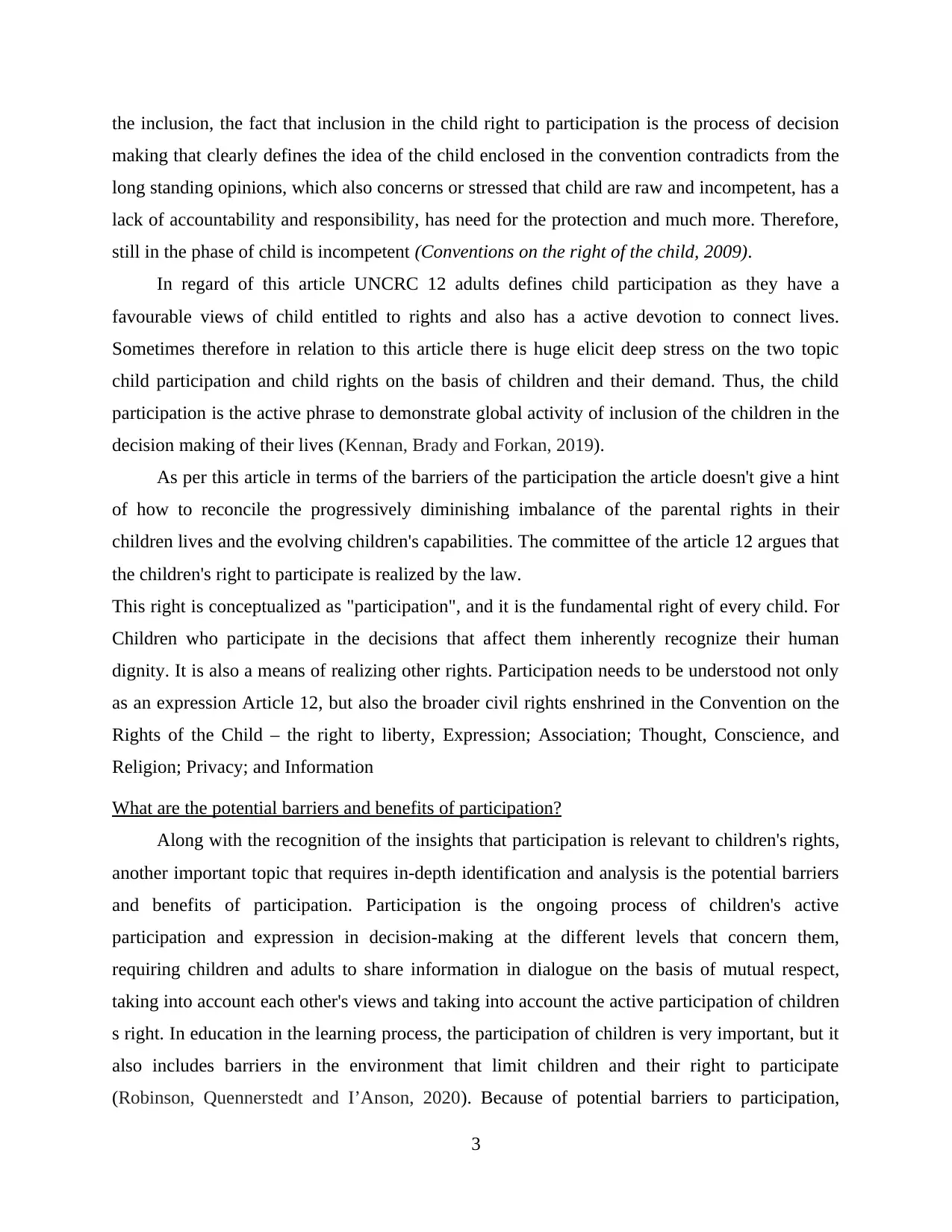
the inclusion, the fact that inclusion in the child right to participation is the process of decision
making that clearly defines the idea of the child enclosed in the convention contradicts from the
long standing opinions, which also concerns or stressed that child are raw and incompetent, has a
lack of accountability and responsibility, has need for the protection and much more. Therefore,
still in the phase of child is incompetent (Conventions on the right of the child, 2009).
In regard of this article UNCRC 12 adults defines child participation as they have a
favourable views of child entitled to rights and also has a active devotion to connect lives.
Sometimes therefore in relation to this article there is huge elicit deep stress on the two topic
child participation and child rights on the basis of children and their demand. Thus, the child
participation is the active phrase to demonstrate global activity of inclusion of the children in the
decision making of their lives (Kennan, Brady and Forkan, 2019).
As per this article in terms of the barriers of the participation the article doesn't give a hint
of how to reconcile the progressively diminishing imbalance of the parental rights in their
children lives and the evolving children's capabilities. The committee of the article 12 argues that
the children's right to participate is realized by the law.
This right is conceptualized as "participation", and it is the fundamental right of every child. For
Children who participate in the decisions that affect them inherently recognize their human
dignity. It is also a means of realizing other rights. Participation needs to be understood not only
as an expression Article 12, but also the broader civil rights enshrined in the Convention on the
Rights of the Child – the right to liberty, Expression; Association; Thought, Conscience, and
Religion; Privacy; and Information
What are the potential barriers and benefits of participation?
Along with the recognition of the insights that participation is relevant to children's rights,
another important topic that requires in-depth identification and analysis is the potential barriers
and benefits of participation. Participation is the ongoing process of children's active
participation and expression in decision-making at the different levels that concern them,
requiring children and adults to share information in dialogue on the basis of mutual respect,
taking into account each other's views and taking into account the active participation of children
s right. In education in the learning process, the participation of children is very important, but it
also includes barriers in the environment that limit children and their right to participate
(Robinson, Quennerstedt and I’Anson, 2020). Because of potential barriers to participation,
3
making that clearly defines the idea of the child enclosed in the convention contradicts from the
long standing opinions, which also concerns or stressed that child are raw and incompetent, has a
lack of accountability and responsibility, has need for the protection and much more. Therefore,
still in the phase of child is incompetent (Conventions on the right of the child, 2009).
In regard of this article UNCRC 12 adults defines child participation as they have a
favourable views of child entitled to rights and also has a active devotion to connect lives.
Sometimes therefore in relation to this article there is huge elicit deep stress on the two topic
child participation and child rights on the basis of children and their demand. Thus, the child
participation is the active phrase to demonstrate global activity of inclusion of the children in the
decision making of their lives (Kennan, Brady and Forkan, 2019).
As per this article in terms of the barriers of the participation the article doesn't give a hint
of how to reconcile the progressively diminishing imbalance of the parental rights in their
children lives and the evolving children's capabilities. The committee of the article 12 argues that
the children's right to participate is realized by the law.
This right is conceptualized as "participation", and it is the fundamental right of every child. For
Children who participate in the decisions that affect them inherently recognize their human
dignity. It is also a means of realizing other rights. Participation needs to be understood not only
as an expression Article 12, but also the broader civil rights enshrined in the Convention on the
Rights of the Child – the right to liberty, Expression; Association; Thought, Conscience, and
Religion; Privacy; and Information
What are the potential barriers and benefits of participation?
Along with the recognition of the insights that participation is relevant to children's rights,
another important topic that requires in-depth identification and analysis is the potential barriers
and benefits of participation. Participation is the ongoing process of children's active
participation and expression in decision-making at the different levels that concern them,
requiring children and adults to share information in dialogue on the basis of mutual respect,
taking into account each other's views and taking into account the active participation of children
s right. In education in the learning process, the participation of children is very important, but it
also includes barriers in the environment that limit children and their right to participate
(Robinson, Quennerstedt and I’Anson, 2020). Because of potential barriers to participation,
3
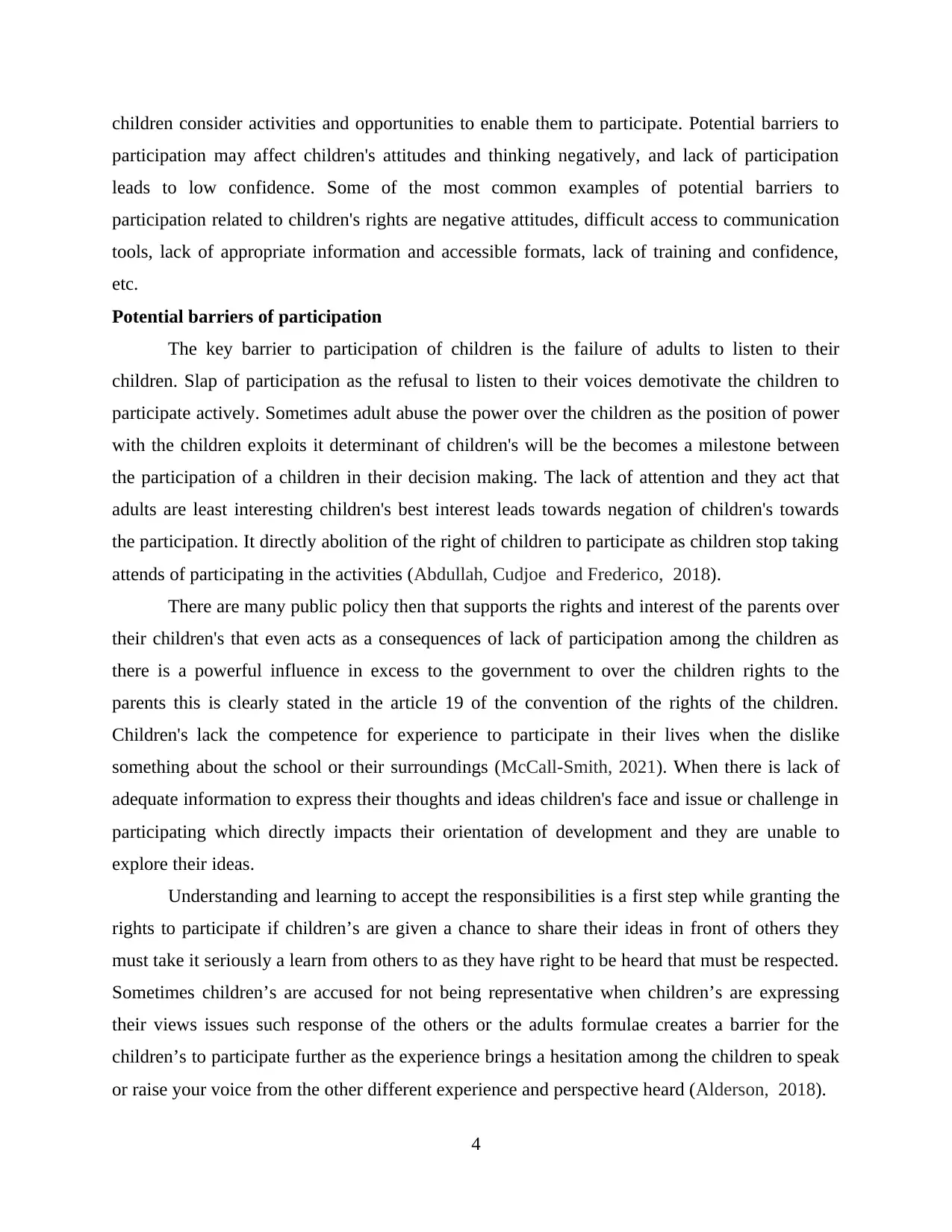
children consider activities and opportunities to enable them to participate. Potential barriers to
participation may affect children's attitudes and thinking negatively, and lack of participation
leads to low confidence. Some of the most common examples of potential barriers to
participation related to children's rights are negative attitudes, difficult access to communication
tools, lack of appropriate information and accessible formats, lack of training and confidence,
etc.
Potential barriers of participation
The key barrier to participation of children is the failure of adults to listen to their
children. Slap of participation as the refusal to listen to their voices demotivate the children to
participate actively. Sometimes adult abuse the power over the children as the position of power
with the children exploits it determinant of children's will be the becomes a milestone between
the participation of a children in their decision making. The lack of attention and they act that
adults are least interesting children's best interest leads towards negation of children's towards
the participation. It directly abolition of the right of children to participate as children stop taking
attends of participating in the activities (Abdullah, Cudjoe and Frederico, 2018).
There are many public policy then that supports the rights and interest of the parents over
their children's that even acts as a consequences of lack of participation among the children as
there is a powerful influence in excess to the government to over the children rights to the
parents this is clearly stated in the article 19 of the convention of the rights of the children.
Children's lack the competence for experience to participate in their lives when the dislike
something about the school or their surroundings (McCall-Smith, 2021). When there is lack of
adequate information to express their thoughts and ideas children's face and issue or challenge in
participating which directly impacts their orientation of development and they are unable to
explore their ideas.
Understanding and learning to accept the responsibilities is a first step while granting the
rights to participate if children’s are given a chance to share their ideas in front of others they
must take it seriously a learn from others to as they have right to be heard that must be respected.
Sometimes children’s are accused for not being representative when children’s are expressing
their views issues such response of the others or the adults formulae creates a barrier for the
children’s to participate further as the experience brings a hesitation among the children to speak
or raise your voice from the other different experience and perspective heard (Alderson, 2018).
4
participation may affect children's attitudes and thinking negatively, and lack of participation
leads to low confidence. Some of the most common examples of potential barriers to
participation related to children's rights are negative attitudes, difficult access to communication
tools, lack of appropriate information and accessible formats, lack of training and confidence,
etc.
Potential barriers of participation
The key barrier to participation of children is the failure of adults to listen to their
children. Slap of participation as the refusal to listen to their voices demotivate the children to
participate actively. Sometimes adult abuse the power over the children as the position of power
with the children exploits it determinant of children's will be the becomes a milestone between
the participation of a children in their decision making. The lack of attention and they act that
adults are least interesting children's best interest leads towards negation of children's towards
the participation. It directly abolition of the right of children to participate as children stop taking
attends of participating in the activities (Abdullah, Cudjoe and Frederico, 2018).
There are many public policy then that supports the rights and interest of the parents over
their children's that even acts as a consequences of lack of participation among the children as
there is a powerful influence in excess to the government to over the children rights to the
parents this is clearly stated in the article 19 of the convention of the rights of the children.
Children's lack the competence for experience to participate in their lives when the dislike
something about the school or their surroundings (McCall-Smith, 2021). When there is lack of
adequate information to express their thoughts and ideas children's face and issue or challenge in
participating which directly impacts their orientation of development and they are unable to
explore their ideas.
Understanding and learning to accept the responsibilities is a first step while granting the
rights to participate if children’s are given a chance to share their ideas in front of others they
must take it seriously a learn from others to as they have right to be heard that must be respected.
Sometimes children’s are accused for not being representative when children’s are expressing
their views issues such response of the others or the adults formulae creates a barrier for the
children’s to participate further as the experience brings a hesitation among the children to speak
or raise your voice from the other different experience and perspective heard (Alderson, 2018).
4
⊘ This is a preview!⊘
Do you want full access?
Subscribe today to unlock all pages.

Trusted by 1+ million students worldwide
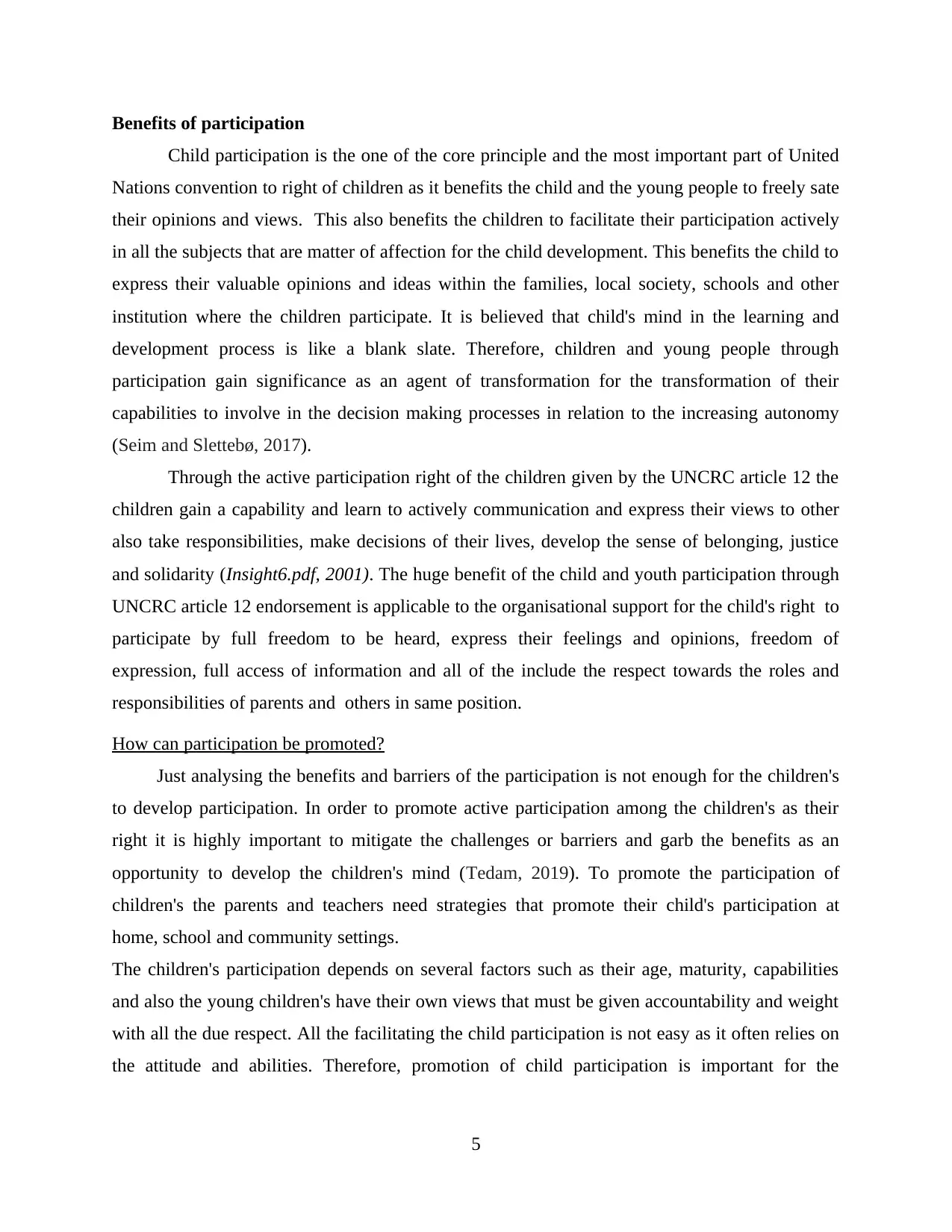
Benefits of participation
Child participation is the one of the core principle and the most important part of United
Nations convention to right of children as it benefits the child and the young people to freely sate
their opinions and views. This also benefits the children to facilitate their participation actively
in all the subjects that are matter of affection for the child development. This benefits the child to
express their valuable opinions and ideas within the families, local society, schools and other
institution where the children participate. It is believed that child's mind in the learning and
development process is like a blank slate. Therefore, children and young people through
participation gain significance as an agent of transformation for the transformation of their
capabilities to involve in the decision making processes in relation to the increasing autonomy
(Seim and Slettebø, 2017).
Through the active participation right of the children given by the UNCRC article 12 the
children gain a capability and learn to actively communication and express their views to other
also take responsibilities, make decisions of their lives, develop the sense of belonging, justice
and solidarity (Insight6.pdf, 2001). The huge benefit of the child and youth participation through
UNCRC article 12 endorsement is applicable to the organisational support for the child's right to
participate by full freedom to be heard, express their feelings and opinions, freedom of
expression, full access of information and all of the include the respect towards the roles and
responsibilities of parents and others in same position.
How can participation be promoted?
Just analysing the benefits and barriers of the participation is not enough for the children's
to develop participation. In order to promote active participation among the children's as their
right it is highly important to mitigate the challenges or barriers and garb the benefits as an
opportunity to develop the children's mind (Tedam, 2019). To promote the participation of
children's the parents and teachers need strategies that promote their child's participation at
home, school and community settings.
The children's participation depends on several factors such as their age, maturity, capabilities
and also the young children's have their own views that must be given accountability and weight
with all the due respect. All the facilitating the child participation is not easy as it often relies on
the attitude and abilities. Therefore, promotion of child participation is important for the
5
Child participation is the one of the core principle and the most important part of United
Nations convention to right of children as it benefits the child and the young people to freely sate
their opinions and views. This also benefits the children to facilitate their participation actively
in all the subjects that are matter of affection for the child development. This benefits the child to
express their valuable opinions and ideas within the families, local society, schools and other
institution where the children participate. It is believed that child's mind in the learning and
development process is like a blank slate. Therefore, children and young people through
participation gain significance as an agent of transformation for the transformation of their
capabilities to involve in the decision making processes in relation to the increasing autonomy
(Seim and Slettebø, 2017).
Through the active participation right of the children given by the UNCRC article 12 the
children gain a capability and learn to actively communication and express their views to other
also take responsibilities, make decisions of their lives, develop the sense of belonging, justice
and solidarity (Insight6.pdf, 2001). The huge benefit of the child and youth participation through
UNCRC article 12 endorsement is applicable to the organisational support for the child's right to
participate by full freedom to be heard, express their feelings and opinions, freedom of
expression, full access of information and all of the include the respect towards the roles and
responsibilities of parents and others in same position.
How can participation be promoted?
Just analysing the benefits and barriers of the participation is not enough for the children's
to develop participation. In order to promote active participation among the children's as their
right it is highly important to mitigate the challenges or barriers and garb the benefits as an
opportunity to develop the children's mind (Tedam, 2019). To promote the participation of
children's the parents and teachers need strategies that promote their child's participation at
home, school and community settings.
The children's participation depends on several factors such as their age, maturity, capabilities
and also the young children's have their own views that must be given accountability and weight
with all the due respect. All the facilitating the child participation is not easy as it often relies on
the attitude and abilities. Therefore, promotion of child participation is important for the
5
Paraphrase This Document
Need a fresh take? Get an instant paraphrase of this document with our AI Paraphraser
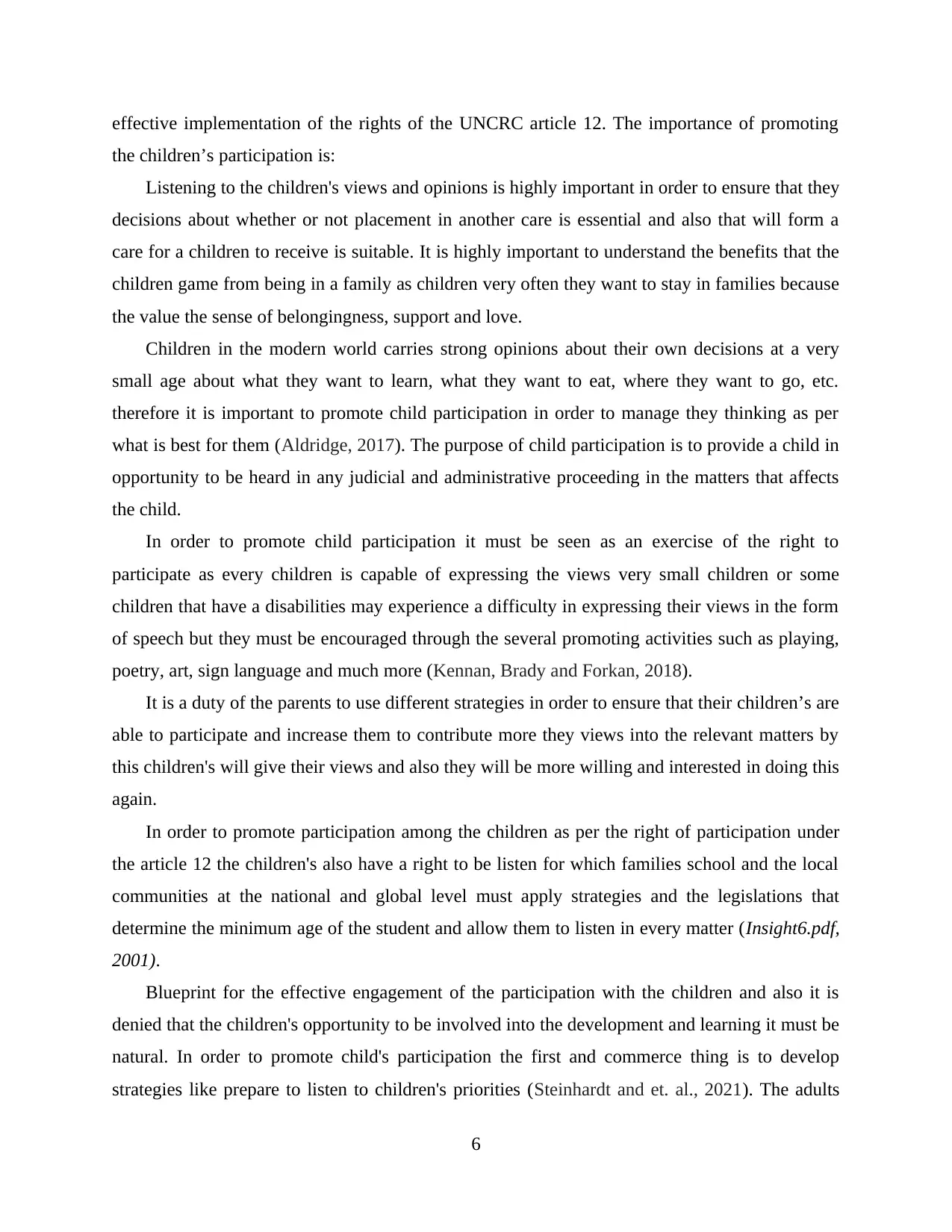
effective implementation of the rights of the UNCRC article 12. The importance of promoting
the children’s participation is:
Listening to the children's views and opinions is highly important in order to ensure that they
decisions about whether or not placement in another care is essential and also that will form a
care for a children to receive is suitable. It is highly important to understand the benefits that the
children game from being in a family as children very often they want to stay in families because
the value the sense of belongingness, support and love.
Children in the modern world carries strong opinions about their own decisions at a very
small age about what they want to learn, what they want to eat, where they want to go, etc.
therefore it is important to promote child participation in order to manage they thinking as per
what is best for them (Aldridge, 2017). The purpose of child participation is to provide a child in
opportunity to be heard in any judicial and administrative proceeding in the matters that affects
the child.
In order to promote child participation it must be seen as an exercise of the right to
participate as every children is capable of expressing the views very small children or some
children that have a disabilities may experience a difficulty in expressing their views in the form
of speech but they must be encouraged through the several promoting activities such as playing,
poetry, art, sign language and much more (Kennan, Brady and Forkan, 2018).
It is a duty of the parents to use different strategies in order to ensure that their children’s are
able to participate and increase them to contribute more they views into the relevant matters by
this children's will give their views and also they will be more willing and interested in doing this
again.
In order to promote participation among the children as per the right of participation under
the article 12 the children's also have a right to be listen for which families school and the local
communities at the national and global level must apply strategies and the legislations that
determine the minimum age of the student and allow them to listen in every matter (Insight6.pdf,
2001).
Blueprint for the effective engagement of the participation with the children and also it is
denied that the children's opportunity to be involved into the development and learning it must be
natural. In order to promote child's participation the first and commerce thing is to develop
strategies like prepare to listen to children's priorities (Steinhardt and et. al., 2021). The adults
6
the children’s participation is:
Listening to the children's views and opinions is highly important in order to ensure that they
decisions about whether or not placement in another care is essential and also that will form a
care for a children to receive is suitable. It is highly important to understand the benefits that the
children game from being in a family as children very often they want to stay in families because
the value the sense of belongingness, support and love.
Children in the modern world carries strong opinions about their own decisions at a very
small age about what they want to learn, what they want to eat, where they want to go, etc.
therefore it is important to promote child participation in order to manage they thinking as per
what is best for them (Aldridge, 2017). The purpose of child participation is to provide a child in
opportunity to be heard in any judicial and administrative proceeding in the matters that affects
the child.
In order to promote child participation it must be seen as an exercise of the right to
participate as every children is capable of expressing the views very small children or some
children that have a disabilities may experience a difficulty in expressing their views in the form
of speech but they must be encouraged through the several promoting activities such as playing,
poetry, art, sign language and much more (Kennan, Brady and Forkan, 2018).
It is a duty of the parents to use different strategies in order to ensure that their children’s are
able to participate and increase them to contribute more they views into the relevant matters by
this children's will give their views and also they will be more willing and interested in doing this
again.
In order to promote participation among the children as per the right of participation under
the article 12 the children's also have a right to be listen for which families school and the local
communities at the national and global level must apply strategies and the legislations that
determine the minimum age of the student and allow them to listen in every matter (Insight6.pdf,
2001).
Blueprint for the effective engagement of the participation with the children and also it is
denied that the children's opportunity to be involved into the development and learning it must be
natural. In order to promote child's participation the first and commerce thing is to develop
strategies like prepare to listen to children's priorities (Steinhardt and et. al., 2021). The adults
6
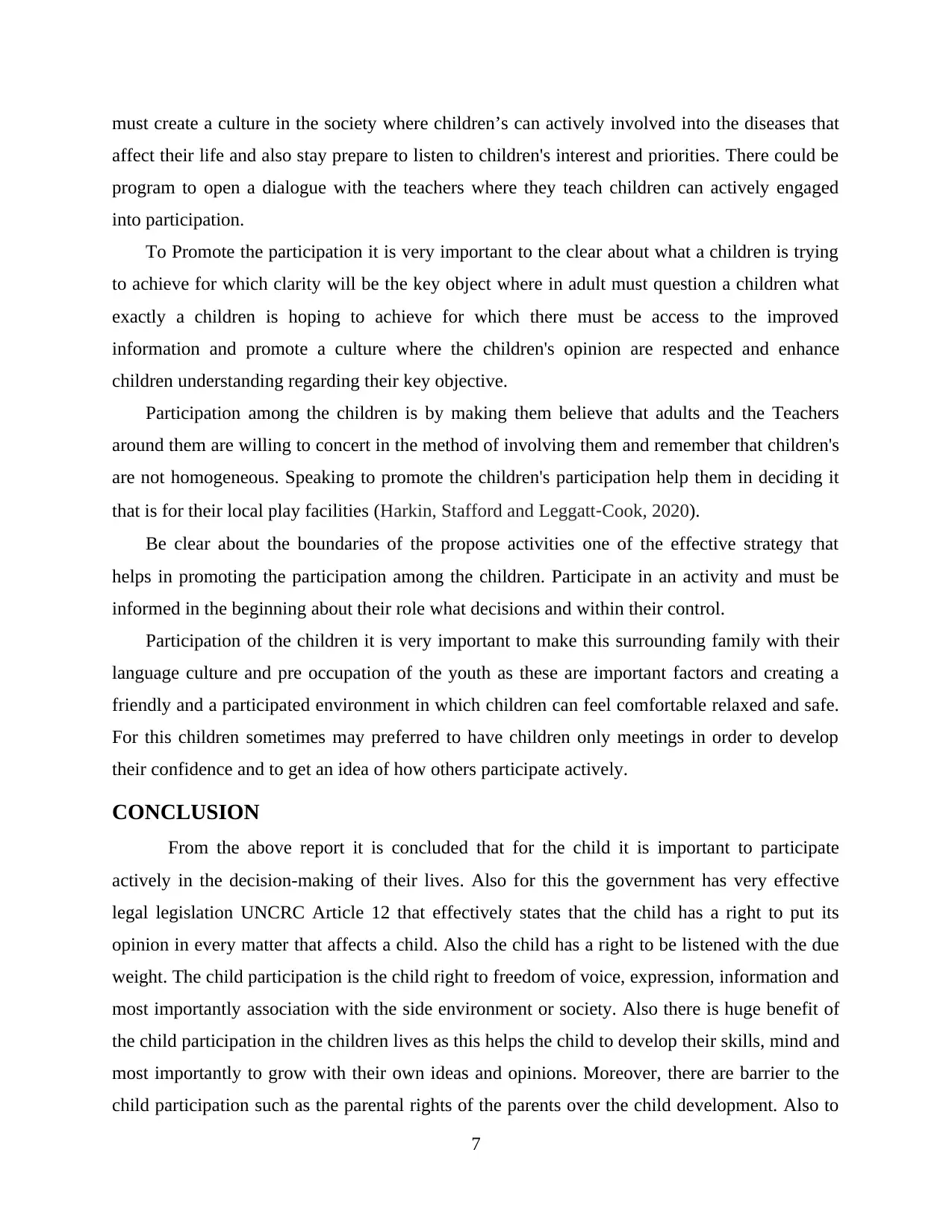
must create a culture in the society where children’s can actively involved into the diseases that
affect their life and also stay prepare to listen to children's interest and priorities. There could be
program to open a dialogue with the teachers where they teach children can actively engaged
into participation.
To Promote the participation it is very important to the clear about what a children is trying
to achieve for which clarity will be the key object where in adult must question a children what
exactly a children is hoping to achieve for which there must be access to the improved
information and promote a culture where the children's opinion are respected and enhance
children understanding regarding their key objective.
Participation among the children is by making them believe that adults and the Teachers
around them are willing to concert in the method of involving them and remember that children's
are not homogeneous. Speaking to promote the children's participation help them in deciding it
that is for their local play facilities (Harkin, Stafford and Leggatt‐Cook, 2020).
Be clear about the boundaries of the propose activities one of the effective strategy that
helps in promoting the participation among the children. Participate in an activity and must be
informed in the beginning about their role what decisions and within their control.
Participation of the children it is very important to make this surrounding family with their
language culture and pre occupation of the youth as these are important factors and creating a
friendly and a participated environment in which children can feel comfortable relaxed and safe.
For this children sometimes may preferred to have children only meetings in order to develop
their confidence and to get an idea of how others participate actively.
CONCLUSION
From the above report it is concluded that for the child it is important to participate
actively in the decision-making of their lives. Also for this the government has very effective
legal legislation UNCRC Article 12 that effectively states that the child has a right to put its
opinion in every matter that affects a child. Also the child has a right to be listened with the due
weight. The child participation is the child right to freedom of voice, expression, information and
most importantly association with the side environment or society. Also there is huge benefit of
the child participation in the children lives as this helps the child to develop their skills, mind and
most importantly to grow with their own ideas and opinions. Moreover, there are barrier to the
child participation such as the parental rights of the parents over the child development. Also to
7
affect their life and also stay prepare to listen to children's interest and priorities. There could be
program to open a dialogue with the teachers where they teach children can actively engaged
into participation.
To Promote the participation it is very important to the clear about what a children is trying
to achieve for which clarity will be the key object where in adult must question a children what
exactly a children is hoping to achieve for which there must be access to the improved
information and promote a culture where the children's opinion are respected and enhance
children understanding regarding their key objective.
Participation among the children is by making them believe that adults and the Teachers
around them are willing to concert in the method of involving them and remember that children's
are not homogeneous. Speaking to promote the children's participation help them in deciding it
that is for their local play facilities (Harkin, Stafford and Leggatt‐Cook, 2020).
Be clear about the boundaries of the propose activities one of the effective strategy that
helps in promoting the participation among the children. Participate in an activity and must be
informed in the beginning about their role what decisions and within their control.
Participation of the children it is very important to make this surrounding family with their
language culture and pre occupation of the youth as these are important factors and creating a
friendly and a participated environment in which children can feel comfortable relaxed and safe.
For this children sometimes may preferred to have children only meetings in order to develop
their confidence and to get an idea of how others participate actively.
CONCLUSION
From the above report it is concluded that for the child it is important to participate
actively in the decision-making of their lives. Also for this the government has very effective
legal legislation UNCRC Article 12 that effectively states that the child has a right to put its
opinion in every matter that affects a child. Also the child has a right to be listened with the due
weight. The child participation is the child right to freedom of voice, expression, information and
most importantly association with the side environment or society. Also there is huge benefit of
the child participation in the children lives as this helps the child to develop their skills, mind and
most importantly to grow with their own ideas and opinions. Moreover, there are barrier to the
child participation such as the parental rights of the parents over the child development. Also to
7
⊘ This is a preview!⊘
Do you want full access?
Subscribe today to unlock all pages.

Trusted by 1+ million students worldwide

promote the rights of the child participation it is important to regulate this legislation into every
child care institution and at the schools and universities in the mandatory manner.
8
child care institution and at the schools and universities in the mandatory manner.
8
Paraphrase This Document
Need a fresh take? Get an instant paraphrase of this document with our AI Paraphraser
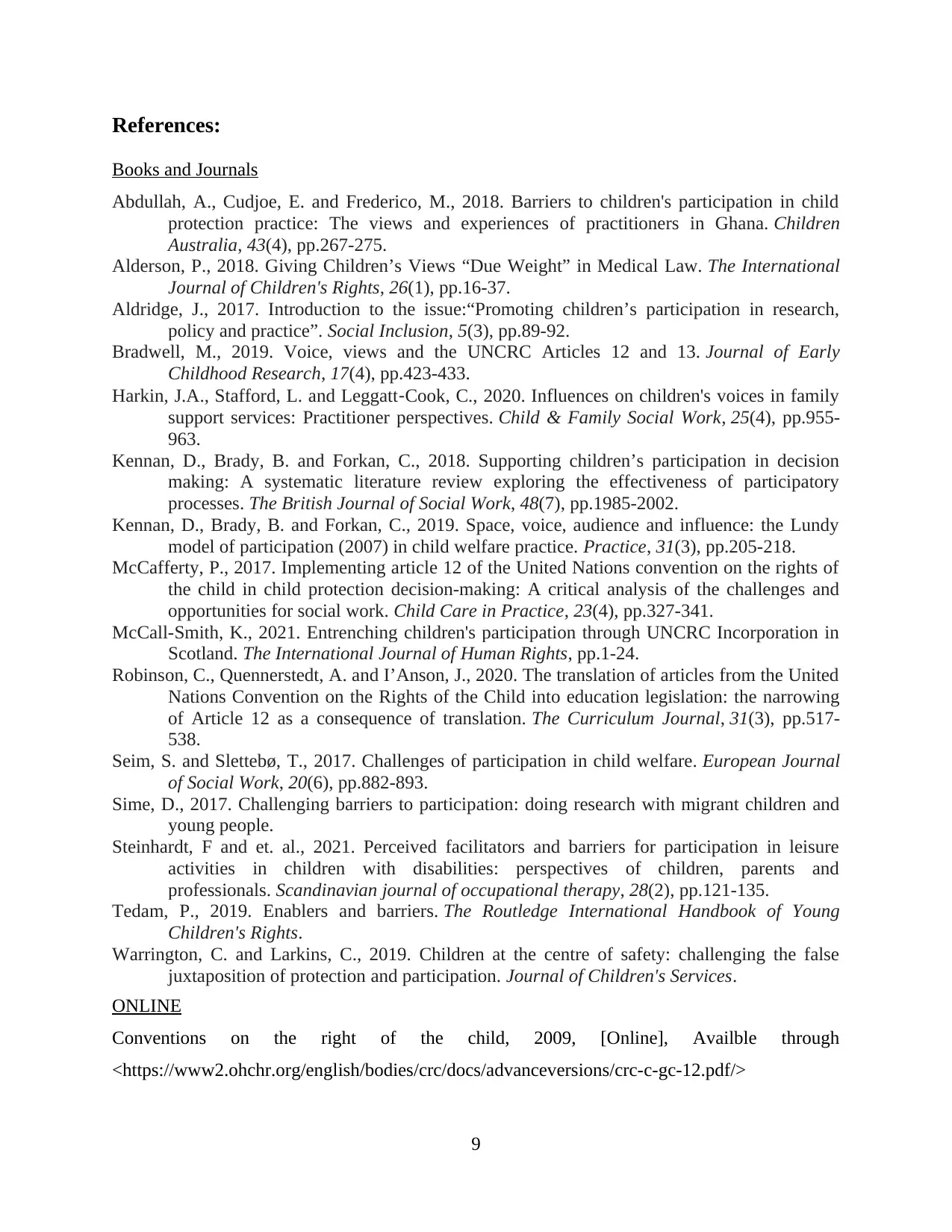
References:
Books and Journals
Abdullah, A., Cudjoe, E. and Frederico, M., 2018. Barriers to children's participation in child
protection practice: The views and experiences of practitioners in Ghana. Children
Australia, 43(4), pp.267-275.
Alderson, P., 2018. Giving Children’s Views “Due Weight” in Medical Law. The International
Journal of Children's Rights, 26(1), pp.16-37.
Aldridge, J., 2017. Introduction to the issue:“Promoting children’s participation in research,
policy and practice”. Social Inclusion, 5(3), pp.89-92.
Bradwell, M., 2019. Voice, views and the UNCRC Articles 12 and 13. Journal of Early
Childhood Research, 17(4), pp.423-433.
Harkin, J.A., Stafford, L. and Leggatt‐Cook, C., 2020. Influences on children's voices in family
support services: Practitioner perspectives. Child & Family Social Work, 25(4), pp.955-
963.
Kennan, D., Brady, B. and Forkan, C., 2018. Supporting children’s participation in decision
making: A systematic literature review exploring the effectiveness of participatory
processes. The British Journal of Social Work, 48(7), pp.1985-2002.
Kennan, D., Brady, B. and Forkan, C., 2019. Space, voice, audience and influence: the Lundy
model of participation (2007) in child welfare practice. Practice, 31(3), pp.205-218.
McCafferty, P., 2017. Implementing article 12 of the United Nations convention on the rights of
the child in child protection decision-making: A critical analysis of the challenges and
opportunities for social work. Child Care in Practice, 23(4), pp.327-341.
McCall-Smith, K., 2021. Entrenching children's participation through UNCRC Incorporation in
Scotland. The International Journal of Human Rights, pp.1-24.
Robinson, C., Quennerstedt, A. and I’Anson, J., 2020. The translation of articles from the United
Nations Convention on the Rights of the Child into education legislation: the narrowing
of Article 12 as a consequence of translation. The Curriculum Journal, 31(3), pp.517-
538.
Seim, S. and Slettebø, T., 2017. Challenges of participation in child welfare. European Journal
of Social Work, 20(6), pp.882-893.
Sime, D., 2017. Challenging barriers to participation: doing research with migrant children and
young people.
Steinhardt, F and et. al., 2021. Perceived facilitators and barriers for participation in leisure
activities in children with disabilities: perspectives of children, parents and
professionals. Scandinavian journal of occupational therapy, 28(2), pp.121-135.
Tedam, P., 2019. Enablers and barriers. The Routledge International Handbook of Young
Children's Rights.
Warrington, C. and Larkins, C., 2019. Children at the centre of safety: challenging the false
juxtaposition of protection and participation. Journal of Children's Services.
ONLINE
Conventions on the right of the child, 2009, [Online], Availble through
<https://www2.ohchr.org/english/bodies/crc/docs/advanceversions/crc-c-gc-12.pdf/>
9
Books and Journals
Abdullah, A., Cudjoe, E. and Frederico, M., 2018. Barriers to children's participation in child
protection practice: The views and experiences of practitioners in Ghana. Children
Australia, 43(4), pp.267-275.
Alderson, P., 2018. Giving Children’s Views “Due Weight” in Medical Law. The International
Journal of Children's Rights, 26(1), pp.16-37.
Aldridge, J., 2017. Introduction to the issue:“Promoting children’s participation in research,
policy and practice”. Social Inclusion, 5(3), pp.89-92.
Bradwell, M., 2019. Voice, views and the UNCRC Articles 12 and 13. Journal of Early
Childhood Research, 17(4), pp.423-433.
Harkin, J.A., Stafford, L. and Leggatt‐Cook, C., 2020. Influences on children's voices in family
support services: Practitioner perspectives. Child & Family Social Work, 25(4), pp.955-
963.
Kennan, D., Brady, B. and Forkan, C., 2018. Supporting children’s participation in decision
making: A systematic literature review exploring the effectiveness of participatory
processes. The British Journal of Social Work, 48(7), pp.1985-2002.
Kennan, D., Brady, B. and Forkan, C., 2019. Space, voice, audience and influence: the Lundy
model of participation (2007) in child welfare practice. Practice, 31(3), pp.205-218.
McCafferty, P., 2017. Implementing article 12 of the United Nations convention on the rights of
the child in child protection decision-making: A critical analysis of the challenges and
opportunities for social work. Child Care in Practice, 23(4), pp.327-341.
McCall-Smith, K., 2021. Entrenching children's participation through UNCRC Incorporation in
Scotland. The International Journal of Human Rights, pp.1-24.
Robinson, C., Quennerstedt, A. and I’Anson, J., 2020. The translation of articles from the United
Nations Convention on the Rights of the Child into education legislation: the narrowing
of Article 12 as a consequence of translation. The Curriculum Journal, 31(3), pp.517-
538.
Seim, S. and Slettebø, T., 2017. Challenges of participation in child welfare. European Journal
of Social Work, 20(6), pp.882-893.
Sime, D., 2017. Challenging barriers to participation: doing research with migrant children and
young people.
Steinhardt, F and et. al., 2021. Perceived facilitators and barriers for participation in leisure
activities in children with disabilities: perspectives of children, parents and
professionals. Scandinavian journal of occupational therapy, 28(2), pp.121-135.
Tedam, P., 2019. Enablers and barriers. The Routledge International Handbook of Young
Children's Rights.
Warrington, C. and Larkins, C., 2019. Children at the centre of safety: challenging the false
juxtaposition of protection and participation. Journal of Children's Services.
ONLINE
Conventions on the right of the child, 2009, [Online], Availble through
<https://www2.ohchr.org/english/bodies/crc/docs/advanceversions/crc-c-gc-12.pdf/>
9

Insight6.pdf, 2001, [Online], Available through<
https://www.unicef-irc.org/publications/pdf/insight6.pdf/>
10
https://www.unicef-irc.org/publications/pdf/insight6.pdf/>
10
⊘ This is a preview!⊘
Do you want full access?
Subscribe today to unlock all pages.

Trusted by 1+ million students worldwide
1 out of 12
Related Documents
Your All-in-One AI-Powered Toolkit for Academic Success.
+13062052269
info@desklib.com
Available 24*7 on WhatsApp / Email
![[object Object]](/_next/static/media/star-bottom.7253800d.svg)
Unlock your academic potential
Copyright © 2020–2026 A2Z Services. All Rights Reserved. Developed and managed by ZUCOL.





